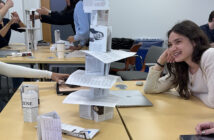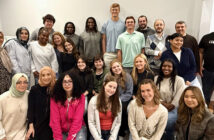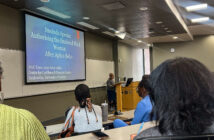Professor Terrance Wiley is a self-proclaimed anarchist.
Wiley is the newest addition to the departments of religion and Africana studies. But there’s no need for alarm.
Wiley joins the ranks of great American thinkers and activists like Henry David Thoreau, Bayard Rustin and Dorothy Day, who he suggests follow an anarchist tradition in his book published earlier this year entitled “Angelic Troublemakers: Religion and Anarchism in America.”
Thoreau wrote “Civil Disobedience,” an argument to give a high authority to one’s conscience over the government’s laws, in 1849, as well as “Walden,” an account of his experience with living off the grid in 1854. Rustin was a leader for civil rights and gay rights in the late 1940s and early 1950s, and Day formed the Catholic Worker Movement in the 1930s.
“I don’t think Thoreau should be taught in most grade schools,” Wiley said. “You know, he’s just more radical. The kind of Thoreau you get is tame — in our world, people are still scared by anarchist language.”
In fact, Wiley believes social movements require a radical element to prosper, and this radical element is not as crazy as most people think. He said the term “anarchist” has a negative connotation in today’s common discourse.
His book, which was produced as a thesis dissertation, originated from Wiley’s inability to speak or read Russian.
While in graduate school, Wiley discovered a connection between Leo Tolstoy, a 19th century Russian writer and philosopher, and Mahatma Gandhi, who led India to independence. What Wiley had found was that Tolstoy’s last letter was written to Gandhi, and Gandhi’s farm in South Africa was called the Tolstoy Farm.
“I wanted to write a book on Tolstoy,” Wiley said.
Wiley was intrigued and decided to research what connected these thinkers and how their non-violent revolutionary movements evolved on transnational scale.
Though he did not endeavor to learn Russian, Wiley used Tolstoy and Gandhi’s philosophies to explore an overarching radicalism in Thoreau, Rustin and Day’s lives.
“You can’t, in good faith, without a sense of irony, stand up and say the Pledge of Allegiance to the flag and then give a lesson on Thoreau,” Wiley said.
In the classroom, Wiley said he seeks to construct a democratic space to develop grassroots solutions instead of feeding his students information. He wants them to be empowered to sort through the information and draw their own connections and conclusions.
“I try to create these deconstructed spaces where, you know, ‘Terrance’ is not ‘Professor Wiley,’ and he’s not an authority,” he said.
James Peterson, director of Lehigh’s Africana studies cluster, is excited to have a professor like Wiley at Lehigh.
“We have a dream team of Africana scholars, and to be honest with you, Terrance is like our Michael Jordan,” Peterson said.
Peterson said he was impressed with Wiley’s qualifications during his interview process, including his status as a published author, trained legal scholar and practitioner and Ivy League scholar. When Peterson met him personally, he realized Wiley was also an engaging intellectual thinker with a warm and deep personality.
“It was clear that he was a progressive thinker with a penchant for activism and for engaging the community,” Peterson said.
Lehigh has responded to the recent issues that have been brought up by the Umoja incident and From Beneath The Rug, but Peterson says that, however great that is for the campus, it is also imperative to have faculty and staff be conscious and proactive in inequality issues on an ongoing basis, rather than simply as a reaction to something bad that happened.
Peterson is looking forward to seeing the Africana studies program grow. Wiley is one of the six new hires in the last few years.
Another project Wiley hopes to take on is revitalizing the previously dormant peace studies program and integrating it into Lehigh’s curriculum with the go-ahead from the dean of the College of Arts and Sciences, Donald Hall.
“I want Terrance to have freedom to revive and refresh the program,” Hall said. “At no time in history is the challenge of living in peace with our fellow citizens more critical or more in danger.”
Wiley believes that a peace studies program differs from political science programs or international relations because it creates an open space to induce societal changes. Peace studies differs from political science programs because it generally allows students to think beyond the constraints of state and question society’s limitations.
He said that if you can change policies and law through the electoral system, running for office, lobbying or through the courts, then there has to be something else to substantiate change: direct action.
“I’m fresh, so I’m still trying to learn what’s happening at Lehigh,” Wiley said. “And if I did things with the peace studies program, would it undermine things that are happening in other places?”
Wiley said that by offering a program where students can create and brainstorm alternate means of change than the traditional avenues, they learn important skills for their future interaction with society.
“Peaceful cooperation and coexistence are key components of any effective solution to the many crises of the 21st century,” Hall said.





Comment policy
Comments posted to The Brown and White website are reviewed by a moderator before being approved. Incendiary speech or harassing language, including comments targeted at individuals, may be deemed unacceptable and not published. Spam and other soliciting will also be declined.
The Brown and White also reserves the right to not publish entirely anonymous comments.